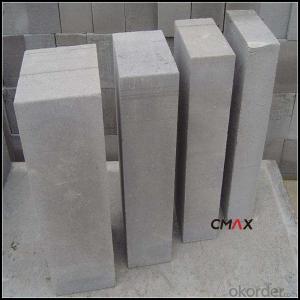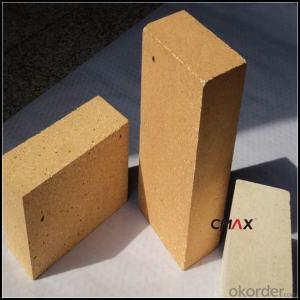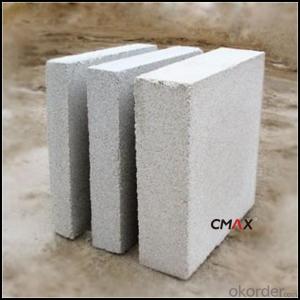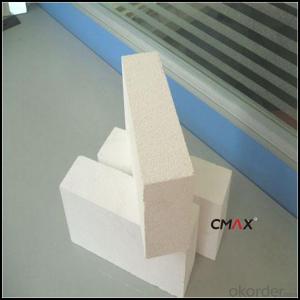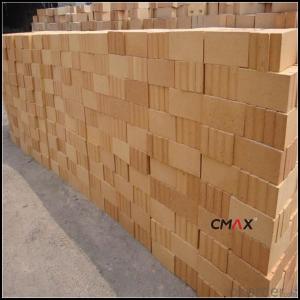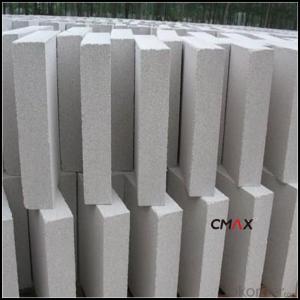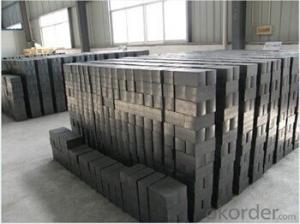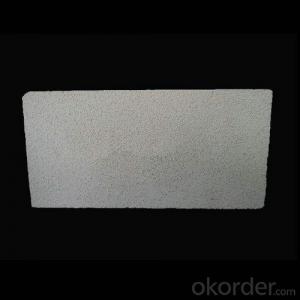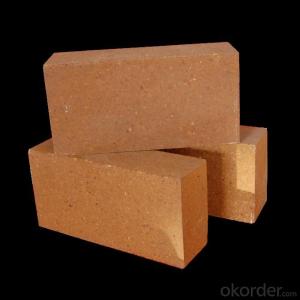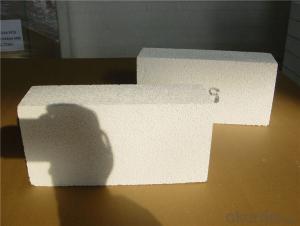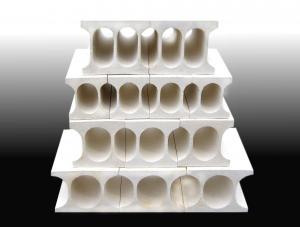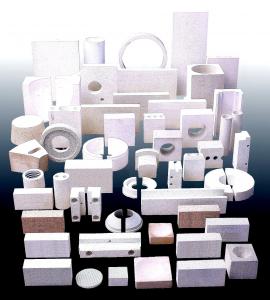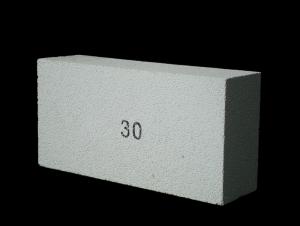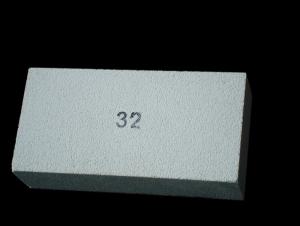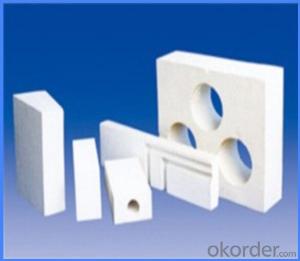Refractory Heat Insulation Brick
- Loading Port:
- China main port
- Payment Terms:
- TT OR LC
- Min Order Qty:
- 2 m.t
- Supply Capability:
- 2000 m.t/month
OKorder Service Pledge
OKorder Financial Service
You Might Also Like
Insulating Brick
CMAX insulating firebricks are classified under temperature between 1300℃ to 1700℃, manufactured from high purity alumina clay.
1.High Alumina Brick used for cement kiln, otary kiln and other high temperature kiln.
2,Magnesia Carbon Brick used for converter furnace,ladle and electric furnace.
3,Insulating Bricks used for insualting layer for high temperature furnce
4,Nozzle Bricks slide gate brick that can be used for tundish and ladle
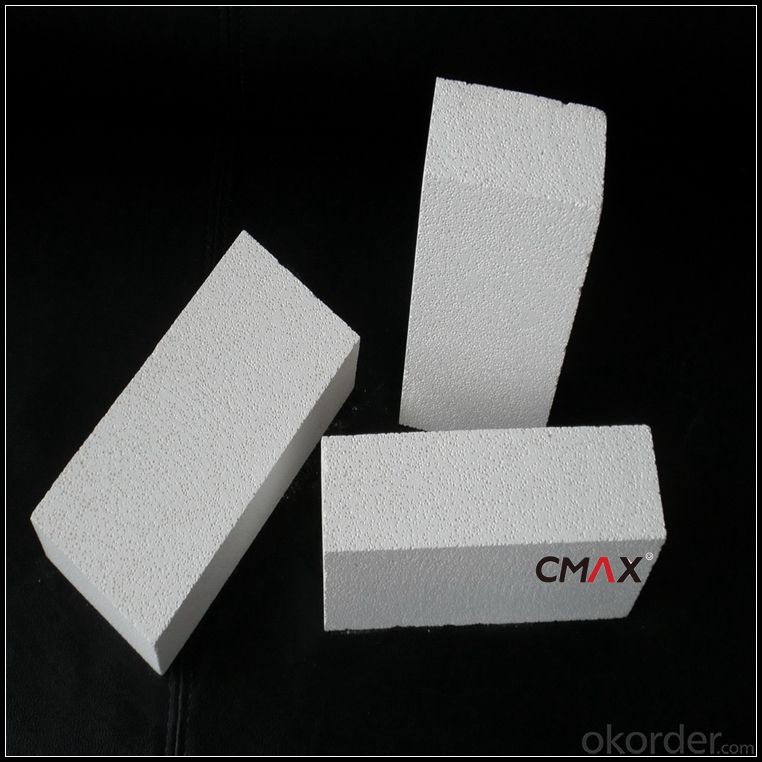
Insulating Brick Features
1.Low thermal conductivity, low thermal capacity, low impurity content
2.High strength
3.Good thermal shock resistance, Corrosion atmosphere resistance
4.High dimensional accuracy
5.Low reheat shrinkage
Insulating Brick Application
glass industries iron & steel industries
ceramics industries non-ferrous metals industries
electrolytic Aluminum industries power generation industries
Heat surface fireproof lining other fire-proof back lining
Process Of Refractory Heat Insulation BrickRaw material to factory→checkout→burdening→stirring→mixing→taking out the raw material
→transfer→enter into mould→press machine extrusion→going out the mould→stoving→going into the furnace
→firing→stopping burn→cooling→open the furnace door→going out the furnace→checkout
→packing→qualified product→putting in storage→sale
Insulating Brick Data Sheet
Classification Temperature (℉/℃) | 3000/1650 |
Bulk Density (g/cm3 ) | ≤1.0 |
Thermal Conductivity | |
800℃, W/m.K | ≤0.39 |
1000℃, W/m.K | ≤0.43 |
1200℃, W/m.K | ≤0.48 |
Reheating Linear Change (%) | 1550℃×12h |
≤0.9 | |
Chemical Composition (%) | |
Al2O3 | ≥75 |
Fe2O3 | ≤0.5 |
Packaging & Shipping
Packaging Details:Be packed in fumigated wooden pallets
Delivery Detail: 30 days after order

Our Services
Optimum solution and product supply of refractories for high temperature industries, such as iron steel, non-ferrous, petrochemical and building materials.
Engineering design, contract and consult for refractories, and civil architecture design.
Research, development, manufacture and sale of superhard materials.
R&D, manufacture and sale of special packing materials for export.
Inspection, supervision and arbitration of refractories.
Consultation and services in refractories information.
Training and cultivation of high-level talents in refractories profession
Sales Network

Company Information
CNBM (China National Building Material) Group is the largest comprehensive building materials group in China that in integrate scientific research, manufacturing and logistics into one entity. The largest building materials and equipment specialists in China. Upon State Council approval, today CNBM owned more than 300 subordinate manufacturing factories and servicing companies. There are 6 fully owned public listed companies and 11 partially owned with substantial shares public listed companies. In many of these fields, CNBM is playing the leading role in the building industry in the country.
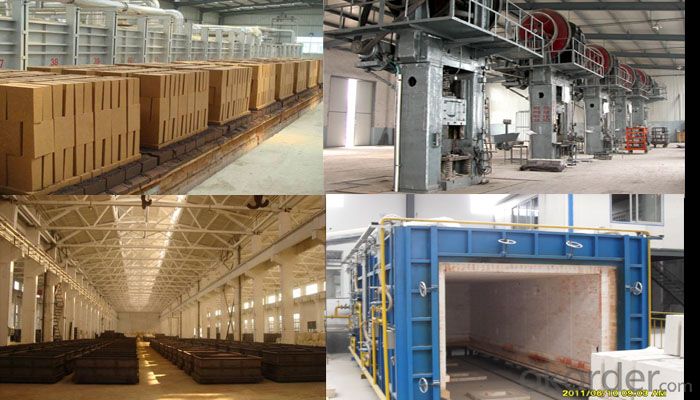
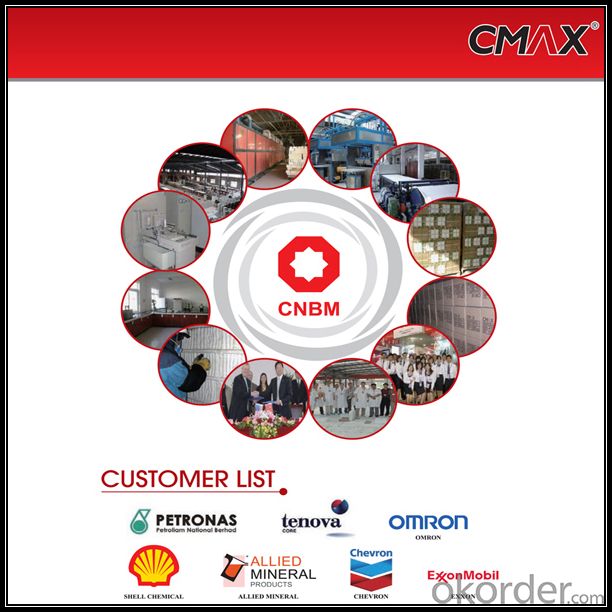
FAQ
1. Which products do you have?
We have all kinds of refractory brick, castable, mortar, cement, ceramic fiber products, etc.
Or you could browse our products to choose what you need.
2. Can you give me a brief introduction of the application of your products?
We are mainly specializing in the refractory materials in iron and steel, cement, glass, ceramics, petrochemical, electric power Industry, etc.
3. If I need your offer, what information do you need?
In order to choose suitable products, it will be appreciated to provide us the information, such us specification, technical data, order quantity, products application etc. If any question, please contact us freely.
- Q:Can insulating fire bricks be used in ceramic kilns?
- Yes, insulating fire bricks can be used in ceramic kilns. These bricks are designed to have high insulating properties, making them ideal for maintaining heat within the kiln. They are lightweight and can withstand high temperatures, making them a suitable choice for ceramic kilns.
- Q:Do insulating fire bricks require any special firebrick mortar for installation?
- Indeed, the installation of insulating fire bricks necessitates the utilization of a specialized firebrick mortar. Regular mortar is unsuitable due to its inability to furnish the essential thermal insulation characteristics or endure the elevated temperatures for which these bricks are intended. Insulating firebrick mortar is purposefully engineered to withstand extreme temperatures and effectively adhere to insulating fire bricks. Typically, this mortar is concocted from an amalgamation of refractory materials, including high-alumina cement, silica sand, and fire clay. Employing the appropriate firebrick mortar is imperative to guarantee a robust and long-lasting installation of insulating fire bricks.
- Q:Can insulating fire bricks be used in boilers for steam generation?
- Yes, insulating fire bricks can be used in boilers for steam generation. Insulating fire bricks have excellent thermal insulation properties, which help to minimize heat loss and increase the overall energy efficiency of the boiler. Additionally, their high temperature resistance makes them suitable for the high heat and pressure conditions present in steam generation applications.
- Q:Can insulating fire bricks be used as a backup insulation in refractory linings?
- Insulating fire bricks have the capability to serve as backup insulation in refractory linings. These bricks are specifically designed with low thermal conductivity, enabling them to effectively minimize heat transfer in high-temperature scenarios. Due to their insulating properties, they are an excellent choice for a secondary insulation layer in refractory linings. This not only aids in reducing heat loss but also enhances overall energy efficiency. Another advantage is their lightweight nature, which simplifies handling and installation compared to alternative refractory materials. Nonetheless, it is crucial to carefully evaluate the application's specific needs and consult with a refractory engineer to confirm the suitability of insulating fire bricks for the particular conditions and performance requirements of the refractory lining.
- Q:Are insulating fire bricks resistant to abrasion or erosion?
- Yes, insulating fire bricks are resistant to both abrasion and erosion.
- Q:Can insulating fire bricks be used in the insulation of boilers?
- Indeed, the utilization of insulating fire bricks is possible for the insulation of boilers. These fire bricks are engineered to endure elevated temperatures and exhibit remarkable efficiency in preventing heat transfer. With their low thermal conductivity, they aid in minimizing heat dissipation from the boiler, thereby enhancing its energy efficiency holistically. Moreover, due to their lightweight composition and ease of installation, insulating fire bricks are an optimal selection for boiler insulation.
- Q:What are the advantages of using insulating fire bricks over traditional bricks?
- Insulating fire bricks offer several advantages over traditional bricks. Firstly, they have a high insulation value, which means they can effectively retain heat and prevent heat loss in applications such as kilns, furnaces, and fireplaces. This insulation property helps in reducing energy consumption and increasing overall efficiency. Secondly, insulating fire bricks have a lightweight structure, making them easier to handle, transport, and install. This can save time and labor costs during construction or maintenance. Additionally, these bricks have excellent thermal shock resistance, meaning they can withstand rapid temperature changes without cracking or breaking. Lastly, insulating fire bricks are chemically stable and have a low thermal conductivity, making them resistant to chemical corrosion and providing a longer lifespan when compared to traditional bricks.
- Q:Can insulating fire bricks be used in kilns or furnaces?
- Yes, insulating fire bricks can be used in kilns or furnaces. Insulating fire bricks are designed specifically to withstand high temperatures and thermal shock, making them ideal for use in kilns or furnaces. They have excellent insulating properties, which help to conserve heat and improve energy efficiency. Additionally, insulating fire bricks are lightweight and easy to install, making them a popular choice for lining the walls and floors of kilns or furnaces. Overall, insulating fire bricks are a reliable and effective solution for maintaining high temperatures and ensuring optimal performance in kilns or furnaces.
- Q:Can insulating fire bricks be used in fireplaces?
- Yes, insulating fire bricks can be used in fireplaces. Insulating fire bricks are specifically designed to withstand high temperatures and provide excellent insulation, making them suitable for use in fireplaces. They are capable of withstanding temperatures up to 3000°F (1650°C), which is well within the operating range of most fireplaces. These bricks are made from special materials that have low thermal conductivity, allowing them to retain heat and prevent it from escaping the fireplace. This insulation property helps to improve the efficiency of the fireplace by keeping the heat inside the firebox and preventing it from dissipating into the surrounding area. Additionally, insulating fire bricks are lightweight, durable, and easy to install, making them a popular choice for fireplace construction or renovation projects.
- Q:Can insulating fire bricks be used in the construction of glass fusing kilns?
- Yes, insulating fire bricks can be used in the construction of glass fusing kilns. These bricks have excellent insulating properties, which helps in maintaining consistent and controlled temperatures inside the kiln. Additionally, they can withstand high temperatures without cracking or breaking, making them suitable for glass fusing kilns.
1. Manufacturer Overview |
|
|---|---|
| Location | |
| Year Established | |
| Annual Output Value | |
| Main Markets | |
| Company Certifications | |
2. Manufacturer Certificates |
|
|---|---|
| a) Certification Name | |
| Range | |
| Reference | |
| Validity Period | |
3. Manufacturer Capability |
|
|---|---|
| a)Trade Capacity | |
| Nearest Port | |
| Export Percentage | |
| No.of Employees in Trade Department | |
| Language Spoken: | |
| b)Factory Information | |
| Factory Size: | |
| No. of Production Lines | |
| Contract Manufacturing | |
| Product Price Range | |
Send your message to us
Refractory Heat Insulation Brick
- Loading Port:
- China main port
- Payment Terms:
- TT OR LC
- Min Order Qty:
- 2 m.t
- Supply Capability:
- 2000 m.t/month
OKorder Service Pledge
OKorder Financial Service
Similar products
New products
Hot products
Related keywords
